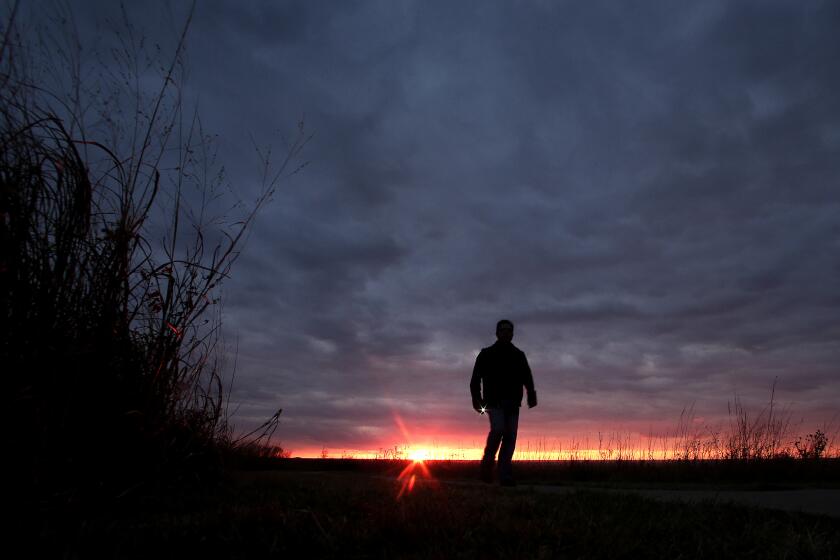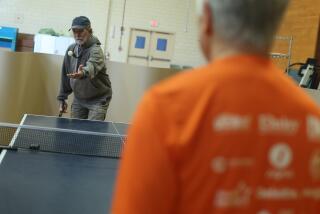Column: Only a seismic shift can reverse the rise in suicides among older adults

- Share via
America is getting older.
That was the snapshot given earlier this year by the U.S. Census Bureau. Our median age is about 40 and rising. In a third of the states, it’s already higher.
Opinion Columnist
LZ Granderson
LZ Granderson writes about culture, politics, sports and navigating life in America.
Remember that, while also considering this: America’s suicide rate in 2022 was the highest seen since 1941 — the tail end of the Great Depression.
The nation’s suicide rate has steadily climbed since the turn of the century. A few years ago research that included these “deaths of despair” was recognized with a Nobel. The numbers are out there to diagnose the problem. But it’s much harder to treat.
You can want to live and die at the same time, says the author of “How Not to Kill Yourself.” Ambivalence is the saving grace of the despondent.
Here’s what the data show: “Rising rates of suicide among people 35 or older.” Men are about four times more likely to kill themselves than women are. The gap in life expectancy between men and women is increasing, and suicide has more to do with that widening gap than heart disease or homicides do.
There is something within American men’s culture that needs to change. There is a lot about growing old in America that needs to change.
A new book explores possible reasons for Bourdain’s death. Trying to place blame cheapens the death and struggles of those who’ve died by suicide — or tried to.
Through the wonders of medicine, sanitation, fitness and nutrition, we are healthier and living longer. By 2060 nearly 1 in 4 Americans will be over 65.
The blessings of longevity come with challenges for the public and private sectors, such as the solvency of Social Security and the shortage of nurses in our hospitals and beds in our nursing homes.
There’s also a challenge for the culture. And whether or not we are now devoting enough thought and conversation to what it means to grow older.
To quote Pierre Teilhard de Chardin: “We are not human beings having a spiritual experience. We are spiritual beings having a human experience.” With age, our bodies and our minds change; our strengths and weaknesses shift. This shouldn’t be catastrophic to our underlying selves. For some, it is. For others, it can be loneliness that takes a spiritual toll. I think these are factors behind the rise in suicide rates among older adults.
When suicide is soaring among older adults and men, that also means a larger swath of society is touched by suicide.
Take the stat for men: 39,255 males are thought to have died from suicide in 2022. That’s a lot of former teammates, frat brothers, hunting buddies and friends. But do men feel safe enough to talk about those losses without being seen as weak? What if they wanted to talk about their own concerns about growing older or being left behind by change — would they be heard and supported? I fear not. That would defy American expectations about men.
It’s critical to foster a culture in which expressing such vulnerability is OK. Without that shift, we are heading toward a society in which suicide among older men will be much more commonplace, as will the shattered lives often left behind.
Similarly, we need to change how we think about old age. It’s important to acknowledge the effects of graying demographics on the federal budget and the labor force, but also on the human soul.
We can shape what aging means. As with most matters of the heart, it starts with communication, and it works best with compassion.
This is a time of year to keep that in mind in all our interactions. For some, the holidays are more stressful or sad than cheerful. Many keenly feel both the sorrows and the joys during this season. Nearly two-thirds of people with mental health issues say this time of year makes their condition worse. Overall, 3 in 5 Americans say so.
It can be a lot.
It’s part of that “human experience,” and we’re all figuring it out as we go along. But here’s one guiding truth about us spiritual beings: Whatever people are facing, at any age and any time of year, we fare better if we don’t feel alone.
Suicide prevention and crisis counseling resources
If you or someone you know is struggling with suicidal thoughts, seek help from a professional and call 9-8-8. The United States’ first nationwide three-digit mental health crisis hotline 988 will connect callers with trained mental health counselors. Text “HOME” to 741741 in the U.S. and Canada to reach the Crisis Text Line.
More to Read
A cure for the common opinion
Get thought-provoking perspectives with our weekly newsletter.
You may occasionally receive promotional content from the Los Angeles Times.














